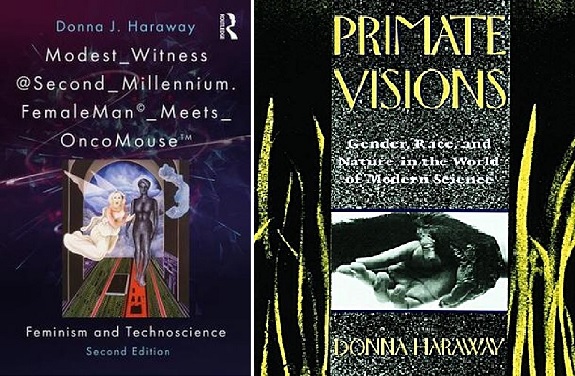Intervention and Responses: a critical historical period for Feminist Science Studies and STS. By Daiwie Fu. Taiwan: China Times Publishing, 2022, 208 pp.
Author: Daiwie Fu (Emeritus Professor, National Yang-Ming Chao-Tong University, Taiwan)
Editor: Auriane van der Vaeren (4S Backchannels)
09/30/2024 | Review
In my 2019 book, A Genealogical History of STS and its Multiple Constructions, where I questioned the often assumed origin of STS in Thomas Kuhn’s work, it had later been pointed out to me that this genealogy did not cover an important field in STS: feminist science studies was missing (hereafter, FSS). In 2022, I therefore published its sequel, Intervention and Responses (hereafter, I&R), where I discussed the important and once troubled relationship between FSS and STS; in particular from the 1980s to 2000, as it was a critical period of formation for the STS discipline and as it was the period when FSS protagonists started to become recognized by the STS community, namely, by the 4S Society. A full recognition of FSS had to wait until 2000, when the first J.D. Bernal Prize—the most honorable 4S award—was awarded to Donna Haraway. Since then, many more FSS scholars received this award.

A Genealogical History of STS and its Multiple Constructions (Fu, 2019) (left); Intervention and Responses (Fu, 2022) (right)
In my review of the historical relationship between STS and FSS, I wanted to tackle two questions that I was grappling with. Firstly, why was it that early influential FSS works were neither read nor recognized by STSers? Namely, whereas FSS was thoroughly engaging with STS works, FSS very much proved to be a special form of science studies. Haraway notably repeatedly questioned this asymmetry between FSS and STS. Secondly, what would the result be if influential FSS works of that time were to be seriously examined by STS scholars in terms of the feminist affordances that these works purported to provide at that time?
For the first question, I reviewed several influential feminists who developed critical arguments in response to key STS works. I evoked Sandra Harding’s thesis of Strong Objectivity that was formulated as a response to the Sociology of Scientific Knowledge (SSK): the Strong Programme. I then proceeded onward with Haraway’s critical discussion of Boyle’s 17th century air pump, where she not only showcases the gendered dimension of this technology, but where she also uses this as an illustration of the masculine struggle in the debate of the epistemological chicken. This was a debate bitterly wrestled between SSK scholars like Harry Collins and Actor Network Theory (ANT) scholars like Bruno Latour in Science as Practice and Culture. I&R also discusses several other feminist scholars, such as Emily Martin and her anthropological response to Bruno Latour on conventional anthropology, or Susan Leigh Star and her criticism on ANT in her work Allergic to Onions. All this to say that the feminist scholarship within STS was already a crowded place even before the advent of the Science Wars debate in 1994-98. In this debate, the postmodernist tide—in which STS and FSS were the purported central figures—was criticized to great extent by famous scientists and philosophers. Critics effectively declared that the postmodernist thought had “gone mad”. Whether this was fair or not, it was this attribution of madness that caused STS and FSS to be grouped together and criticized jointly. Even though STS and FSS scholars had their singular ways of dealing with the science wars—for instance with FSS reacting through cold-shouldering or asserting that “my enemy’s enemy is, only perhaps, my friend”—it was this science wars that led quite a few STS people to be more open to FSS and also showed a deeper appreciation for the worth of FSS.
For the second question, as the author of my 2019 big STS book and my working on and teaching of STS in East Asia for two decades, I attempted to analyze more critically the actual feminist takeaways offered within influential feminist works of that time. I therefore thoroughly reviewed and commented on two eminent works in FSS; two books by Haraway: Modest_Witness@second_Millennium.FemaleMan©_Meets_OncoMouse™ (1997), and Primate Visions: gender, race, and nature in the world of modern science (1988). Primate Visions is a complex and carefully written book about a history of modern primatology. It seeks to balance between the temptations of four research traditions: STS, Marxism, natural science, and gender and anti-racism. As for Modest_Witness, in addition to this balancing act, Haraway included semiotics, figurations and tropes, as well as literary theories to enrich her discussions on the advent of the second millennium, postmodernism, and all sorts of new biotechnologies and information sciences.
To read through these two books, which are quite different from ordinary STS books, is really challenging for an ordinary STS scholar to say the least. Although extremely rich and multilayered, some of Haraway’s discussions of the history of primatological theory development in Primate Visions are a bit straight-lined, for example on the development of theories of chimpanzee behaviors, and thereby seem to make little to no room for the symmetrical comparisons between the old theories to be replaced and new theories. So too, in Modest_Witness, when Haraway suggests a complex operation of “figurations and tropes”, how exactly her uses of them are different from the uses of metaphors developed in the research traditions of STS and the philosophy of science remains unclear. I&R provides a thorough development of this proposed critical discussion of prominent FSS works. And I believe that further such works would be as insightful to FSS as FSS has been and still is to STS.

Modest_Witness (Haraway, 1997) (left); Primate Visions (Haraway, 1998) (right)
I end this contribution with a quotation from Haraway in an interview from 2018 where Thyrza N. Goodeve asked her why the book title Modest_Witness began with the term “modest witness”. Haraway replied:
This is the influence of Leviathan and the Air Pump…The impact that book had on everyone was enormous but its argument…incorporated nothing from feminist science studies. So, in a significant, deliberate way, Modest_Witness was a reaction to it.
As much as this event is serendipitous, it proves to be historically essential for our understanding of the connection between STS and FSS. While it is a shame that STS did not incorporate feminist insights much earlier in its history, STS may have had fair reasons not to be able to do so back then. Be it because there were not enough young feminist scholars and literary experts within STS, or because Haraway’s books are famously difficult reads, sometimes for feminists themselves. This might for instance explain why after Modest_Witness was first published in 1997, Goodeve interviewed Haraway soon after and published a book the next year to provide guidance in understanding Haraway. Haraway herself admits that her ideas are sometimes more clearly expressed in her interview than in her book. The second edition of Modest_Witness, which came out 20 years later, in fact contains a new introductory interview with Haraway, plus a whole series of conceptual map-poems to guide the new readers.
Daiwie Fu is Professor Emeritus, National Yang-Ming University, Graduate Institute of STS, Taiwan. Before turning to STS around 2000, his field of interest was the history and philosophy of science with a focus on history of science in China, gender and medicine; he has published English journal articles extensively in these areas. His previous book in Chinese is Assembling the New Body: Gender/Sexuality, Medicine, and Modern Taiwan (2005). He was the founding editor-in-chief of EASTS Journal (2007-12). He is currently preparing the groundwork for writing the next book in English on East Asian STS.
Published: 09/30/2024
